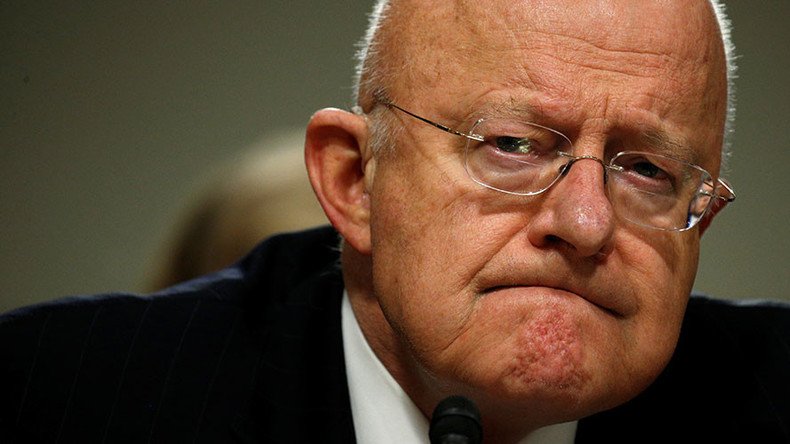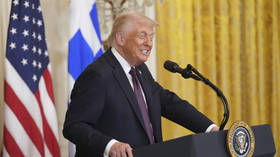‘Zero proof’: Twitter reacts to Clapper’s claims that RT influenced US election

Amused social media users have taken to Twitter following claims by the Director of National Intelligence, James Clapper, that RT’s reporting on US issues was part of a campaign to influence the US election.
The outgoing director said RT was part of a “multifaceted Russian campaign” aimed at “promoting a particular point of view, disparaging our system, our alleged hypocrisy about human rights, etc.”
Clapper was briefing the Senate Armed Services Committee on Thursday, at a hearing about cybersecurity challenges. “Whatever crack, fissure they could find in our tapestry, they would exploit it,” he continued.
DNI Clapper: 'RT was very active in disparaging our system, our alleged hypocrisy about human rights, etc' https://t.co/gdgj29ASpLpic.twitter.com/fhTl3gRpxD
— RT America (@RT_America) January 5, 2017
The comments prompted a wave of reactions from social media users who ridiculed the notion.
It's painful listening to James Clapper offering Congress ZERO proof of #russianhacking . It's proof that having the Clap hurts.
— Ecklebob Chiselfritz (@RotNScoundrel) January 5, 2017
What DNI Clapper means is that @RT_com posted facts that interfered with US mainstream media's attempt to rig the election for Hillary pic.twitter.com/i9A59wPPW9
— Project Purge 🇺🇸 (@_ProjectPurge) January 5, 2017
DNI Clapper: "Yeah, USA has 1000s of media outlets ... but they are all beaten by ONE Russian media: @RT_com 😱😱😱"
— Trump Rebuilds USA (@Corporatocrazy) January 5, 2017
"DNI Clapper" RT is bad because it might say something different than our controlled/approved media outlets!
— IsisisGoldstein 🐸 (@engine26medic) January 5, 2017
If Obama bff Clapper had a smoking gun on Russia hacking he would be waving it in front of every camera not repeating stale talking points
— Jack Posobiec (@JackPosobiec) January 5, 2017
Clapper went on to say that Russia’s use of fake news and hacking to interfere in the US election was cause for “grave concern”.
"I don't think that we have ever encountered a more aggressive or direct campaign to interfere in our election process," Clapper claimed, adding that Russia poses an “existential threat” to the United States. He admitted, however, that the alleged hacking didn’t influence the outcome of elections.
Twitter responses to Clapper’s testimony ranged from the incredulous to the hilarious.
DNI Clapper: Russia did it.
— TheWrathOfGood (@SunTzuOnline) January 5, 2017
Congress: Proof?
DNI Clapper: Classified.
Let us know when you have something other than #butthurt over election
Clapper says RT is fake news,propaganda-well then why did RT pundits like Ed Schultz & Thom Hartman support Hillary? WAKE UP!
— War on Information (@HillaryGuess) January 5, 2017
So Clapper says Russia used “RT, social media, fake news”, and a dash of hacking… So we should invade immediately.
— Austin Wade (@austinwade) January 5, 2017
DNI Clapper saying the #russianhacking was an act of espionage, not an attack "per se" and that US engages in similar behavior.
— Girls Really Rule. (@girlsreallyrule) January 5, 2017
As a method of countering Russian interference, Clapper suggested re-establishing the United States Information Agency, the body that oversaw US government propaganda between 1953 and 1999 before being replaced by the Broadcasting Board of Governors (BBG).
“We could do with having a USIA on steroids to fight this information war a lot more aggressively than we’re doing right now,” Clapper said. This statement also sparked a response with several people suggesting the body already existed it just isn’t doing its job very effectively.
already happened via RFE. BBG budget of c.$750 > x2 Sputnik Intl. RFE actively funds antiRus media. prob its crap at its propaganda job https://t.co/3HFBpByyuQ
— BenAris (@bneeditor) January 5, 2017
In practice this would be a US version of RT, which Clapper spent part of his testimony disparaging. https://t.co/c7YLa2vYFZ
— Spencer Ackerman (@attackerman) January 5, 2017
Cha-Ching! RT @emptywheel: Clapper endorses a US Info Agency on steroids.
— ScottWhitmore (@ScottWhitmore) January 5, 2017
(I see a bunch of 'roided up contractors tweeting nonsense.)
Last month President Barack Obama asked US intelligence agencies to conduct a full review of alleged “Russian hacking.” Clapper told Congress that an unclassified version of that report will be released to the public "early next week".













